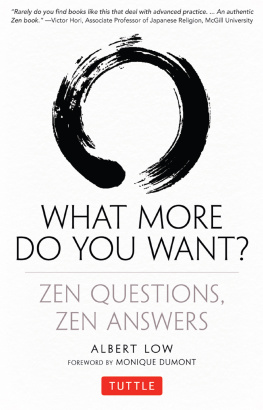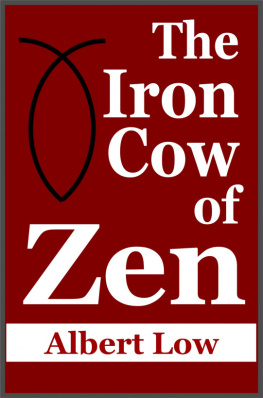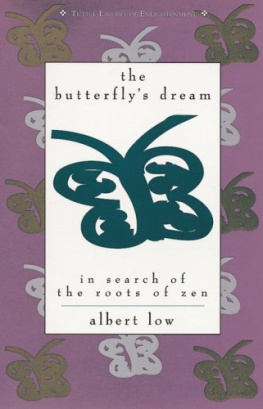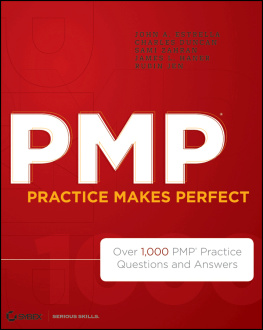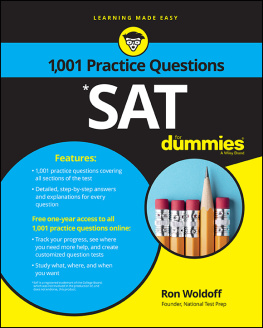I would like to thank my wife, Jean, for her expert editing, many suggestions and support; Monique Dumont for her editorial comment, and for her introductions to the various parts of the book; Fred Bloom and Jacqueline Vischer for their kind comments and suggestions for improving the manuscript. I would also like to thank the Sangha of the Montreal Zen Center for their many questions, which have formed the basis of this book. Special thanks also go to Jeffrey Frith for his generous donation of the illustrations.
On Awakening
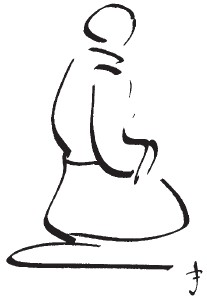
Our quest is to come home; our home is the transcendent. St. Augustine said, You would not seek Me if you had not already found Me. Zen master Hakuin said something similar, From the beginning all beings are Buddha. He elaborated on this later in the same set of verses adding, Coming and going we never leave home. What, practically, does home mean? By drawing on my own experience I will try to indicate what it means. I say, experience but coming home is not an experience.
The evening after a sesshin (retreat) in December 1974 I came to awakening. At the request of Philip Kapleau, I wrote down what happened, and what had led up to the awakening. The account was published in the journal Zen Bow , Winter and Spring 1975, published by the Rochester Zen Center, Rochester, New York. It was written in the hope that it might inspire others on the long and somewhat lonely journey of awakening, and is reprinted for that reason, but also to give an example of what it means to work on a koan.
Lighting a Lamp of the Law
(Zen Bow editors note: This article began as a letter to roshi from a 45-year-old man, capsuling his post-sesshin experience. After reading it, we urged him to write at greater length about his daily life and practice. Excerpts from this account comprise the first section of the article. He was also asked to describe more fully his experience at the sesshin, leading up to kensho. Following this comes the actual letter to roshi, an afterword, and a response by the roshi. It is hoped that the article will not only be interesting to Zen Bow readers, but will also be a source of encouragement and inspiration to our practice.)
Daily Practice
My work is in the personnel department of a company and consists in administering salaries and making organization analysis. According to the way people judge these things, it could be said that I am moderately successful.
My marriage has been a great success and has produced three very fine children. My life is a full one with varied interests.
This is all said because so often people worry about whether they can possibly carry on Zen practice and live in the world at the same time. But really they should not be concerned, because it is entirely possible. It is unlikely that anyone would consider me exceptional, and it should be taken as a great consolation that if one person can carry on Zen practice, a full business career, and family life, anyone can do it.
However, it is not done without what one might call sacrifice, or without determination and some measure of courage. Perhaps this story might help others to arouse this determination in themselves.
I started real Zen practice in 1966 when, through a series of coincidences or good karma, I encountered Yasutani Roshi. He had the kindness to visit Canada and conduct a zazenkai or workshop for eleven most unlikely candidates for Buddhism. Before this encounter my spiritual life had been one flounder after another, until in 1964, exhausted and depressed, I started sitting. This sitting was completely untutored and could not strictly be called Zen, but it did give some results. The value of a teacher was apparent to me once I met with Yasutani, and he showed me the correct postures to use for meditation, and how to follow the breath.
After the zazenkai I made inquiries about further Zen training. Can anyone imagine the joy and gratitude that was felt on hearing that a sesshin was about to take place in Rochester, at which an American Zen teacher, Philip Kapleau, was to be installed?
But the joy also had a most devastating effect on me in that it awakened in some way the most terrible fear of death, which was to haunt me almost without respite for the next two years. My blood pressure rose alarmingly, and I was saturated by terrible anxiety and psychological numbness. I was terrified of being alone, and as my work necessitated frequent visits away from home, and staying overnight in hotels, I sometimes felt like a being in hell. On one occasion I was so sure that I was going to die that I stopped the car and got out so that I would not die unattended. As it happened, the shock of the cold air when getting out of the car braced me and brought me back to my senses.
The doctor recommended tranquilizers, but I knew that to yield to these would probably be the end of zazen. In any case, there was the constant and abiding faith that zazen would of itself, in due time, bring about a cure. During this period, my teacher gave constant encouragement and pointed out that, in effect, to have such a fear was good fortune in that it would drive one deeper into ones practice, as indeed it turned out to do. The force and power of the anxiety aroused great energy, and the sitting that was done during those anxious times was very deep.
My work was also a great help and, although I was constantly tempted to withdraw from it in some way, I hung on. The very mundaneness, the inconsequential problems, the battles and disagreements, gave support that enabled me to continue my practice. Although the struggle was wearing, in a deep way a profound reconciliation developed between my life of Zen and my business life. More and more they ceased to be two independent lives. The constant humiliations that were suffered through trying to introduce new ideas (and these humiliations sometimes were very great) were a powerful ego abrasive. Thomas Merton tells the story of a Christian monk who paid people to humiliate him, and many Zen stories tell of masters who humiliate their most ardent followers because they know that humiliation undoubtedly is the greatest ally that a person who is serious in his practice can have. It truly has no parallel. Used wisely and without cowering, it corrodes the ego like acid.
During one hot summer I developed insomnia. It started with my losing one or two nights sleep because of the heat, and continued through my becoming concerned that the sitting schedule that I had established so painfully would be upset. This insomnia was to last for eighteen months, during which time I suffered some of the most excruciating tensions. Once again there was no question of taking sleeping pills. I tried them once or twice, but they ruined the sitting for the next day. Sometimes it was possible to sit instead of sleep, but at other times the tension became so great that I could do nothing but crawl around the room on my hands and knees. It is said that religion begins with a cry for help, and there have been several times when silently I cried out with all my force, Oh you forces of good in the universe, please, please come to my help now! Strangely enough, when this cry came from the hara there would be peace. My teacher urged me to go on with zazen. Go to work exhausted if you have to, but dont give up your practice.
Of course, there is the problem of time. One does have to practice intensely and it is also necessary to give a good deal of time to it. My wife and I have practiced zazen now for eight years from 5:00 until 6:45 each morning. This means that we have to rise about 4:30 a.m. daily, with a rest on Saturday morning. We also practice for an hour in the evening, again with Friday evening off when we sometimes go to a show. Once a month, except during the very hot weather, the two of us have a one-or two-day sitting over a weekend. We also found it helpful to read inspirational books, particularly those telling of accounts of monks and laymen who have overcome difficulties in their search for enlightenment. So in effect, much of our time is spent in Buddhism.

